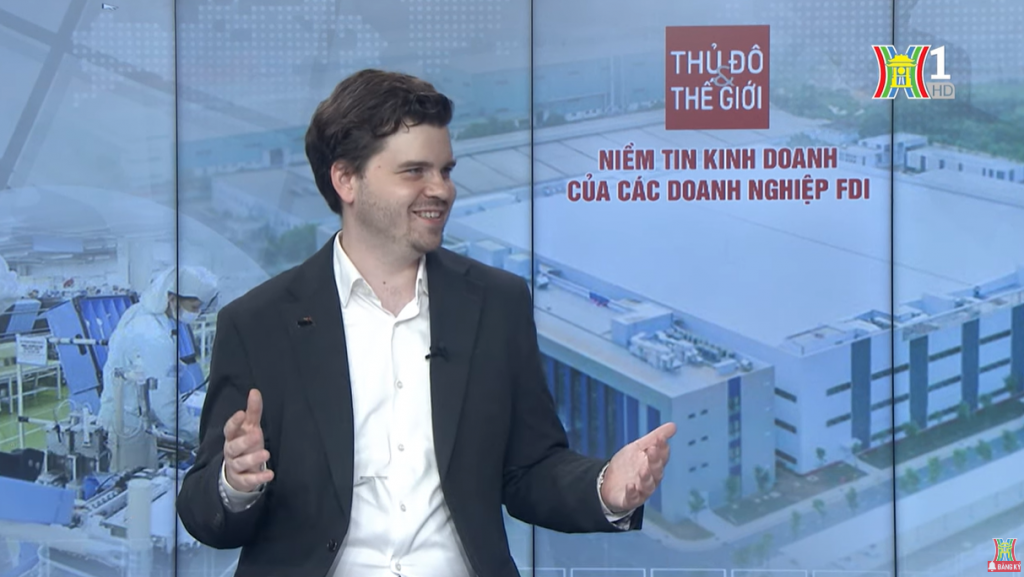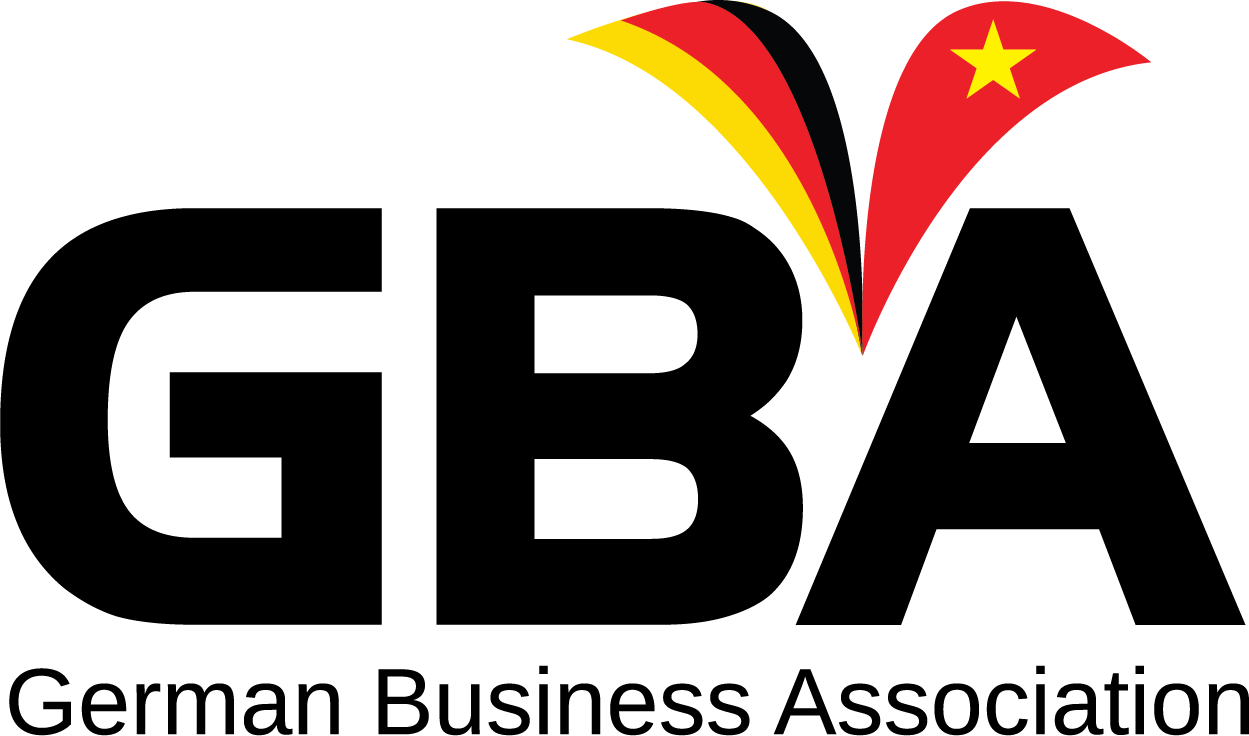Business confidence is pivotal in attracting foreign investment. When the business confidence index of foreign enterprises towards a locality or country rises, it becomes a preferred destination for many foreign investors. In a recent episode of “Business Confidence of FDI” on Hanoi Radio & Television Broadcasting, GBA Chairman Mr. Alexander Ziehe emphasized the importance of business confidence in the investment decisions of FDI enterprises. He also offered suggestions for making Vietnam a locality with a comprehensive business environment for FDI enterprises. Mr. Ziehe discussed investment stories of foreign enterprises and highlighted key factors they consider when investing in Vietnam.
Watch the full interview (in Vietnamese) here>>> and below is the English script.

Question 1: FDI enterprise highly appreciates the investment environment in Vietnam. In your opinion, for an FDI enterprise to decide to invest in a locality or a country, there are many factors involved. How important is business confidence in the investment decision of an FDI enterprise?
Answer: The business confidence survey we conduct annually with Eurocham, in cooperation with European Chambers of Commerce, evaluates European investors’ views on Vietnam. This is not the only decisive factor, but it provides a solid foundation for many FDI enterprises to understand the investment environment in Vietnam. It helps FDI enterprises to confidently do business, identify growth areas, and understand the investment challenges in Vietnam. Overall, Vietnam is highly rated by many investors through the survey results.
Question 2: Vietnam’s GDP growth in the first six months of the year is over 6%. How will this positively impact the growth of FDI enterprises, sir?
Answer: Vietnam once again proves itself as one of the global leaders in growth, not only in general growth but also in quality growth. Moreover, Vietnam is increasingly becoming an attractive consumer market. We also see many new consumer brands entering the Vietnamese market, forming supply chains and enhancing production capacity in Vietnam.
This year has generally been a challenging year not only in Vietnam but also in Asia and the world. However, in an unstable world, Vietnam still demonstrates political stability, which benefits Vietnam as an attractive investment destination.
Question 3: How do you assess the business confidence index of FDI enterprises towards Hanoi in particular and Vietnam in general recently? What are the advantages and challenges for FDI enterprises that have invested or will invest here?
Answer:
We are measuring the level of success that companies are facing. Do they want to invest more? Do they see that their growth and business operations are generally going well? Many companies with FDI projects here are also exporting. Therefore, if business activities slow down, FDI enterprises will have to reconsider choosing Vietnam as a production, business, or transshipment point.
We also see that some localities, such as Hanoi and Hai Phong, have made many changes in infrastructure. And whichever factors investors are more concerned about, localities should improve, digitize, and shorten cumbersome procedures.
Question 4: Talking about the business environment prospects in Vietnam in the short and long term, what are your views?
Answer:
Looking at the short-term situation, there have been many improvements. However, there are still some limitations. For example, traffic congestion in major cities. Traffic and infrastructure are also challenges that should be addressed soon. Cross-border procedures and finances need to be digitized and simplified, with less paperwork.
Vietnam is in a very good position as a hub of the global supply chain. Local supply chain providers have improved product quality and are increasingly complying with international standards. This allows your business to collaborate with a local supplier if you want to manufacture here, or if you want to supply to another factory in the world from Vietnam.
Question 5: What are the current challenges for FDI enterprises in localities like Hanoi? What conditions does Hanoi need to improve to become a locality with a comprehensive business environment for FDI enterprises?
Answer:
First of all, Hanoi is a good investment location. Hanoi is close to China, especially with its connection to Hai Phong, an important seaport, which has helped attract many projects. Additionally, there are significant investors from South Korea, the US, and China who have invested considerably in the North. The supply chain has also developed very well. This shows that Hanoi is an attractive location and is certainly attracting new large investments.
Hanoi is a very crowded city, so traffic during peak hours, especially between provinces, can sometimes be challenging. I think it is important to continue improving infrastructure and maintaining the pace. But overall, Hanoi certainly offers many positive prospects for investors.
Question 6: In recent years, Vietnam has become an attractive destination for many foreign investors. However, in the long term, how should Vietnam improve its business environment to facilitate FDI enterprises and build better trust among them?
Answer:
I think it is important for Vietnam to clearly identify key areas, focus on the sectors where Vietnam is strong, and support industries where Vietnam excels to help businesses operate more easily. For example, consumer electronics is a sector that has developed significantly in Vietnam over the past decade, and I believe there are other industries where Vietnam can also stand out in the long term by supporting these businesses or industries.
Especially, it is crucial to create conditions for FDI enterprises to produce sustainably. Encouraging and supporting businesses to produce clean energy is necessary.
Therefore, having such measures to address challenges will help Vietnam stand out in the long term. And I think this openness needs to be maintained to be ready to receive feedback from FDI enterprises and the foreign business community.
In conclusion:
Recently, EuroCham released the Business Confidence Index in Vietnam, which slightly decreased from 52.8 in Q1 to 51.3 in Q2 of 2024. This indicates that Vietnam needs to continue adjusting its policies to maintain growth momentum. The Business Confidence Index survey, conducted with 1,400 EuroCham members, serves as a measure of the sentiment of European businesses operating in Vietnam.
This report provides an overview of the business environment in Vietnam, highlighting the legal and administrative challenges that are hindering business confidence.
Although the Business Confidence Index has decreased, nearly 70% of European businesses still express optimism about Vietnam’s economic growth over the next five years. This reflects strong confidence in the potential of the Vietnamese market.
One of the biggest challenges mentioned in the report is the complex administrative procedures and unclear regulations, leading to difficulties in obtaining permits and approvals, including visas and work permits for foreign workers, along with inconsistencies between different levels of government.
To attract more FDI and stimulate economic growth, we recommends that Vietnam improve several areas: streamline administrative processes and procedures, reduce complexity and ensure consistency in processing, develop core infrastructure, improve transportation systems, ports, and bridges, simplify visa and work permit procedures, facilitate conditions for foreign experts to work in Vietnam, and create a stable and safe business environment.
